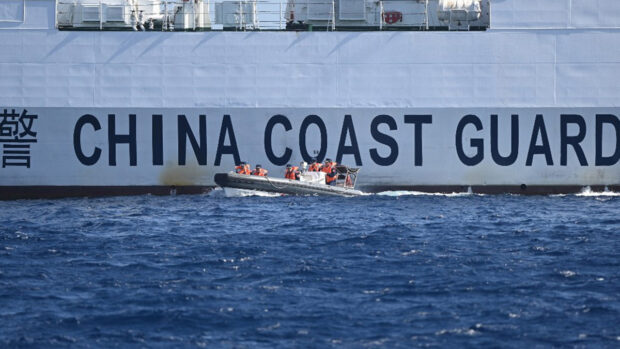
Foreign envoys, and PH lawmakers accused Chinese coast guard vessels of “dangerous” maneuvers and use of water canon to block a Filipino vessel dropping supplies to its outpost TED ALJIBE/ AGENCE FRANCE-PRESSE
MANILA, Philippines — Foreign envoys and Filipino lawmakers on Tuesday blasted China for its once more aggressive action in the West Philippine Sea, demanding them to respect and adhere to international laws.
China on April 30 fired water cannons against two Philippine vessels BRP Bagacay and BRP Datu Bankaw en route to Scarborough Shoal, causing damage to the ships.
Among those who expressed condemnation of China’s action was United States Ambassador to the Philippines MaryKay Carlson.
READ: China water cannons 2 PH vessels in Scarborough Shoal anew
Disrupting a lawful mission
“The [People’s Republic of China] used dangerous maneuvers and water cannons to disrupt a lawful Philippine mission providing food and fuel to fisherfolk within the Philippines’ exclusive economic zone,” said Carlson in a tweet.
Carlson said the Philippines can count on her nation’s support to “uphold freedom of navigation and international law.”
In a separate tweet, Australian Ambassador Hae Kyong Yu labelled China’s action as an “obstruction.”
“China’s dangerous maneuvers and obstruction encountered by Philippine Government vessels in the South China Sea — today at Scarborough Shoal — create risks of miscalculation and endanger peace. Disputes must be resolved peacefully under the United Nations Convention on the Law of the Sea,” she said.
READ: PH wins arbitration case over South China Sea
We will not back down
For Senator Francis Tolentino, chair of the Senate’s special panel on maritime and admiralty zones, China’s act just shows its continued aggression and incursion in Philippine waters.
“This incident again highlights China’s persistent aggression toward civilian vessels, an actuation not countenanced by international law. It should not however prevent us from doing what is right today and in the future,” said Tolentino.
Meanwhile, Senator Jinggoy Estrada said China’s “aggravating bullying tactics” can no longer be overlooked, especially in light of the Balikatan drills.
“We strongly condemn the continuous aggressive actions of the Chinese naval forces that put the lives of our fellow Filipinos at risk by resorting to water cannons. Their interference with our routine and lawful activities within our territorial jurisdiction is unacceptable and must be stopped immediately,” said Estrada.
Adhere to international law
“Once again, we urge China’s government to adhere to international law, practice restraint, and refrain from actions that threaten peace and security in the region,” he added.
China, on the other hand, defended its action by repeating its same old argument, claiming ownership of Scarborough Shoal, which it refers to as Huang Yan Dao.
“The Philippine Coast Guard vessel and official vessel entered waters of Huangyan Dao without Chinese permission, which seriously infringed on China’s sovereignty. China Coast Guard took necessary measures to expel them in accordance with the law. China urges the Philippines to stop making infringement and provocations at once and not to challenge China’s resolve to defend our sovereignty,” said Chinese Foreign Ministry Spokesperson Lin Jian in a press briefing.
In 2013, the Philippines challenged China’s assertions before the Permanent Court of Arbitration in The Hague, Netherlands. It ruled overwhelmingly in favor of the Philippines in 2016. Despite this ruling, Chinese maritime assets continue to swarm and assert aggression in the territory.